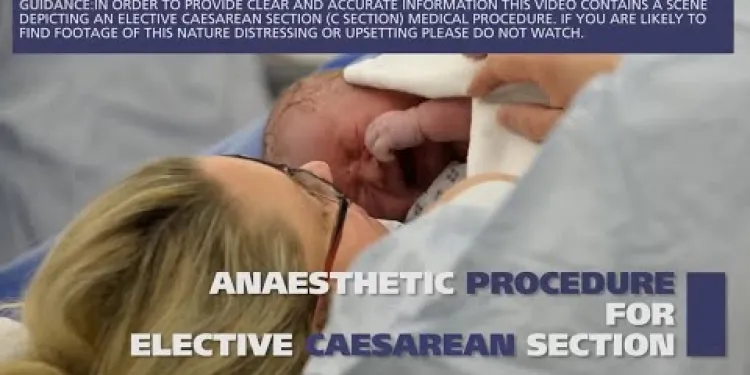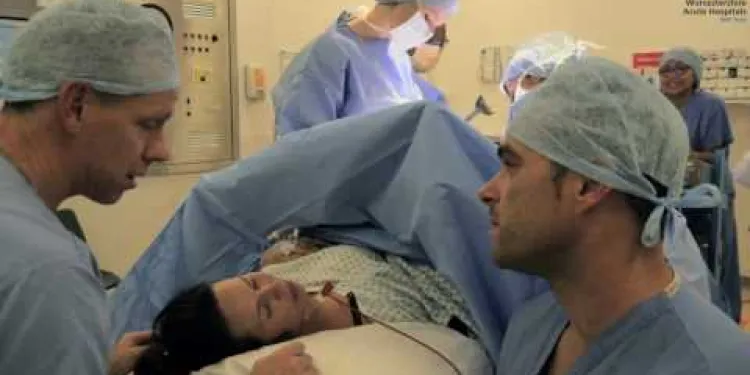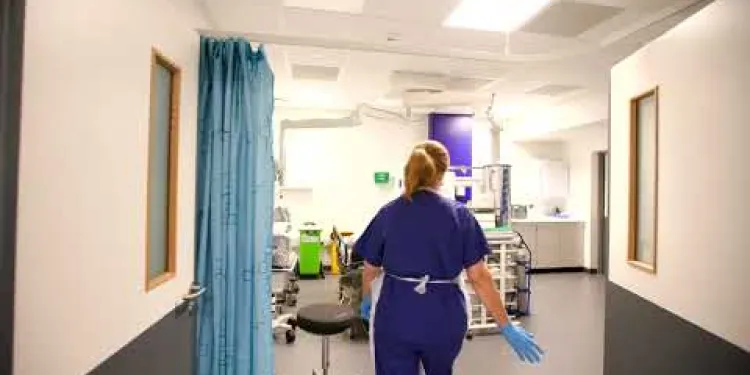Find A Professional
More Items From Ergsy search
-

Anaesthetic procedure for elective caesarean section (C section)
Relevance: 100%
-

Your Caesarean birth
Relevance: 98%
-

Having a Caesarean Section
Relevance: 95%
-

My General Anaesthetic: What's Going To Happen? Sarah's Story at Worcestershire Royal Hospital.
Relevance: 89%
-

What electric cars does Hyundai offer in the UK?
Relevance: 88%
-

Can I find electric SUVs from various brands in the UK?
Relevance: 85%
-

Spinal Anaesthesia for Caesarean Section
Relevance: 81%
-

Are there electric vans available in the UK?
Relevance: 80%
-

Does Volvo sell electric cars in the UK?
Relevance: 80%
-

Are there any electric vehicles from MINI available in the UK?
Relevance: 79%
-

Planned caesarean section
Relevance: 79%
-

Can IVF be used for gender selection?
Relevance: 72%
-

Are Audi electric vehicles available in the UK?
Relevance: 72%
-

Is the EV grant available for electric vans?
Relevance: 71%
-

What brands of Electric Vehicles are available in the UK?
Relevance: 70%
-

Can I buy a Nissan electric vehicle in the UK?
Relevance: 69%
-

Does MG offer any electric vehicles in the UK?
Relevance: 67%
-

Pre operative Information for Planned Caesarean Birth
Relevance: 66%
-

Do the grants cover used electric cars?
Relevance: 65%
-

Does Kia sell electric cars in the UK?
Relevance: 64%
-

Having a planned caesarean section
Relevance: 63%
-

Are there any electric vehicles from BMW available in the UK?
Relevance: 63%
-

Are there tax benefits for owning an electric car?
Relevance: 62%
-

Surgery under local anaesthetic in the Minor Ops Unit at North Bristol NHS Trust
Relevance: 61%
-

Are there any electric vehicles from Peugeot available in the UK?
Relevance: 60%
-

Is there a grant for electric vans?
Relevance: 60%
-

Children Act 1989 section 20 - Legislation
Relevance: 59%
-

Having an anaesthetic for your operation - for over 8s
Relevance: 59%
-

Does Renault offer electric vehicles in the UK?
Relevance: 58%
-

Are there electric vehicles from Honda available in the UK?
Relevance: 57%
-

What should I consider when buying an electric car regarding grants?
Relevance: 57%
-

Supreme Court Delivers Key Ruling on Electoral Reform
Relevance: 55%
-

Top 5 questions about having a general anaesthetic
Relevance: 54%
-

Can a facelift be combined with other procedures?
Relevance: 51%
-

Do electric motorcycles qualify for any grants?
Relevance: 50%
-

What electric vehicles does Skoda offer in the UK?
Relevance: 49%
-

What grants are available in the UK for electric car purchase?
Relevance: 48%
-

Endoscopy Unit
Relevance: 46%
-

Are there any grants for purchasing electric bikes?
Relevance: 44%
-

Can businesses get grants for electric vehicles?
Relevance: 43%
Anaesthetic Procedure for Elective Caesarean Section (C-Section)
Introduction to Elective Caesarean Section
An elective caesarean section is a planned surgical procedure to deliver a baby typically performed when vaginal delivery poses risks to the mother or baby. Ensuring adequate anaesthesia is crucial to keeping the mother comfortable and pain-free during the operation.Types of Anaesthesia
There are primarily three types of anaesthesia used for a C-section: 1. **Spinal Anaesthesia**: This is the most commonly used technique for elective C-sections. It involves injecting a single dose of local anaesthetic into the fluid surrounding the spinal cord, providing numbness from the chest down. 2. **Epidural Anaesthesia**: Often used during labour and can continue through the C-section if required. It involves placing a catheter in the epidural space of the spine, allowing continuous delivery of anaesthetic. 3. **General Anaesthesia**: Reserved for emergency situations or if spinal/epidural anaesthesia is contraindicated. The patient is rendered unconscious during the procedure.Preoperative Preparation
Before the procedure, the patient will undergo a thorough preoperative assessment. This includes reviewing medical history, current medications, and any potential anaesthetic allergies. Patients are advised to fast for at least six hours prior to the surgery to reduce the risk of aspiration during anaesthesia.Administration of Anaesthesia
In the operating theatre, an anaesthetist will administer the chosen anaesthetic. For spinal or epidural anaesthesia, the patient will sit or lie on their side while the anaesthetist cleans the spine area and uses a sterile needle to inject the anaesthetic. Patients may experience a tingling sensation as the anaesthetic takes effect, leading to numbness.Intraoperative Monitoring and Care
Once anaesthesia is administered, the anaesthetist will continuously monitor the patient's vital signs, such as heart rate, blood pressure, and oxygen levels, throughout the procedure. Additional medications can be administered if required, and patient comfort will be a priority.Postoperative Care and Recovery
After the C-section, the anaesthetist will supervise the initial recovery period, managing pain with medications like NSAIDs or opioids as needed. Patients will be closely monitored for any adverse reactions to the anaesthetic, and support with pain management will continue in the postnatal ward.Conclusion
Proper anaesthetic management for an elective caesarean section is vital to ensuring the safety and comfort of the mother. Spinal and epidural anaesthesia are preferred due to their effectiveness and minimal impact on the baby. With thorough preoperative assessment and careful monitoring, the anaesthetic procedure can significantly contribute to a positive birthing experience.Frequently Asked Questions
What types of anaesthesia are used for an elective C section?
The most common types are spinal anaesthesia, epidural anaesthesia, and general anaesthesia. Spinal and epidural anaesthesia are preferred as they allow you to be awake during the procedure.
How does spinal anaesthesia work?
Spinal anaesthesia involves injecting a local anaesthetic into the fluid around your spinal cord, numbing the lower half of your body.
What is the difference between spinal and epidural anaesthesia?
Spinal anaesthesia is a single injection into the spinal fluid, while epidural anaesthesia involves placing a catheter in the epidural space to provide continuous anaesthetic.
Will I be awake during the C section?
Yes, if you receive spinal or epidural anaesthesia, you will be awake but numb from the abdomen down.
Can my partner be present in theatre?
In most cases, your partner can be present if you have spinal or epidural anaesthesia. However, they may not be allowed if you require general anaesthesia.
How long does the anaesthetic take to work?
Spinal anaesthesia works almost immediately, while epidural anaesthesia may take about 10-20 minutes to become fully effective.
Are there any risks associated with spinal or epidural anaesthesia?
While generally safe, there are risks such as low blood pressure, headache, or, rarely, nerve damage.
What should I expect after the anaesthetic is administered?
You will feel numbness in your lower body and possibly some pressure or tugging during the procedure; pain should be minimal or absent.
How long does the numbness last after the C section?
The numbness usually lasts a few hours. You will be monitored as sensation gradually returns.
Will I feel pain during the C section?
You should not feel pain, although you might feel sensations of pressure or tugging.
What happens if the spinal or epidural anaesthesia does not work properly?
If the spinal or epidural anaesthesia is inadequate, additional local anaesthetic may be administered or you might be converted to general anaesthesia.
Can I choose the type of anaesthesia I receive?
Your anaesthetist will discuss the options with you, taking into account medical history and preferences to decide the best choice.
What are the benefits of spinal or epidural anaesthesia over general anaesthesia?
Benefits include being awake to see and hear your baby immediately after birth, fewer risks compared to general anaesthesia, and quicker recovery times.
Can I eat or drink before my C section?
You will be advised to avoid eating and drinking for a certain period before the surgery, usually 6-8 hours for solids and 2-4 hours for clear fluids.
How is pain managed after the surgery?
Post-operative pain is usually managed with medications including paracetamol, NSAIDs, and sometimes opioids. Your anaesthetist will provide a pain management plan.
Useful Links
Useful links from: Planned caesarean section
- North Bristol NHS Trust - Planned Caesarean Section Official page of North Bristol NHS Trust providing comprehensive information on planned caesarean sections, including preparation, procedure, and recovery.
- NHS - Caesarean section NHS page offering detailed information on caesarean sections, including reasons for the procedure, risks and benefits, and recovery tips.
- Tommy's - Planning a C-section Tommy's charity website providing guidance on planning a caesarean section, including what to expect, how to prepare, and post-surgery recovery.
- BabyCentre UK - Planned Caesarean Birth BabyCentre UK's guide on planned caesarean births, offering advice on preparation, the procedure itself, and recovery.
Useful links from: Having a planned caesarean section
- NHS - Caesarean section (C-section) Information about caesarean sections, reasons for needing one, the procedure, recovery, and the risks involved, provided by the NHS.
- NHS - St Michael's Hospital Official page of St Michael's Hospital, part of the University Hospitals Bristol NHS Foundation Trust, providing information about the services and specialties available at the hospital.
- Tommy's - C-section Detailed information from Tommy’s, a UK pregnancy charity, about planning and preparing for a caesarean section, including what to expect before, during, and after the surgery.
- NCT - Planning a caesarean section Advice and information from the National Childbirth Trust (NCT), a UK charity for parents, about planning and experiencing a caesarean section.
Useful links from: Your Caesarean birth
- NHS - Caesarean Section Comprehensive information on caesarean sections from the NHS, including reasons for a C-section, what happens during the procedure, recovery, and potential risks.
- Tommy's - Caesarean Section: What Happens and Recovery Tommy's provides detailed guidance on what to expect during a caesarean section and what the recovery process entails, as well as tips for post-operation care.
- NCT - Elective Caesarean Birth Information from the National Childbirth Trust (NCT) about elective caesarean births, including preparation, the operation process, and advice for recovery.
- Birth Trauma Association - Caesarean Section The Birth Trauma Association offers support and information for those affected by a traumatic birth experience, including caesarean sections, with tips on coping and recovery.
Useful links from: Spinal Anaesthesia for Caesarean Section
- NHS - Anaesthetic choices for planned caesarean This NHS page provides information on the different anaesthetic options available for women during a planned caesarean section, including spinal anaesthesia.
- Royal College of Anaesthetists - Information for Mothers The Royal College of Anaesthetists offers resources and information about anaesthesia during childbirth, including the use of spinal anaesthesia for caesarean sections.
- NHS - Complications of Spinal Anaesthesia This NHS page discusses possible complications associated with spinal anaesthesia, providing important information for patients considering this type of anaesthesia for caesarean sections.
- Birthrights - Your Rights in Childbirth Birthrights, a UK-based charity, provides factsheets and advice on rights during childbirth, including information about the choice and refusal of medical interventions such as spinal anaesthesia.
Useful links from: Having a Caesarean Section
- NHS - Caesarean Section Comprehensive information provided by the NHS about caesarean sections, including reasons for the procedure, risks, recovery, and what to expect.
- Tommy's - Caesarean Section: What to Expect Tommy's charity offers detailed guidance on what to expect when you have a caesarean section, including tips on preparation, the procedure itself, and recovery.
- NCT - Caesarean Section Information The National Childbirth Trust (NCT) provides an array of resources related to caesarean sections, covering topics from decision making to recovery and emotional wellbeing.
- Birth Trauma Association - Caesarean Section The Birth Trauma Association offers support and information for parents dealing with the emotional and physical aspects of caesarean sections.
Useful links from: Pre operative Information for Planned Caesarean Birth
- NHS - Caesarean Section Comprehensive information from the NHS on what to expect before, during, and after a caesarean section, including potential risks and recovery tips.
- Tommy's - Planned Caesarean Section Guidance from Tommy's, a UK charity, on planned caesarean sections, including preparation, the procedure itself, and post-operative care.
- NCT - Preparing for a Caesarean The National Childbirth Trust (NCT) offers advice on preparing for a caesarean section, detailing what to expect and how to manage recovery.
- Birthrights - Caesarean Sections Birthrights, a UK charity supporting human rights in childbirth, provides detailed information on caesarean sections, focusing on rights and choices.
- Ergsy carfully checks the information in the videos we provide here.
- Videos shown by Youtube after a video has completed, have NOT been reviewed by ERGSY.
- To view, click the arrow in centre of video.
- Most of the videos you find here will have subtitles and/or closed captions available.
- You may need to turn these on, and choose your preferred language.
- Go to the video you'd like to watch.
- If closed captions (CC) are available, settings will be visible on the bottom right of the video player.
- To turn on Captions, click settings .
- To turn off Captions, click settings again.
More Items From Ergsy search
-

Anaesthetic procedure for elective caesarean section (C section)
Relevance: 100%
-

Your Caesarean birth
Relevance: 98%
-

Having a Caesarean Section
Relevance: 95%
-

My General Anaesthetic: What's Going To Happen? Sarah's Story at Worcestershire Royal Hospital.
Relevance: 89%
-

What electric cars does Hyundai offer in the UK?
Relevance: 88%
-

Can I find electric SUVs from various brands in the UK?
Relevance: 85%
-

Spinal Anaesthesia for Caesarean Section
Relevance: 81%
-

Are there electric vans available in the UK?
Relevance: 80%
-

Does Volvo sell electric cars in the UK?
Relevance: 80%
-

Are there any electric vehicles from MINI available in the UK?
Relevance: 79%
-

Planned caesarean section
Relevance: 79%
-

Can IVF be used for gender selection?
Relevance: 72%
-

Are Audi electric vehicles available in the UK?
Relevance: 72%
-

Is the EV grant available for electric vans?
Relevance: 71%
-

What brands of Electric Vehicles are available in the UK?
Relevance: 70%
-

Can I buy a Nissan electric vehicle in the UK?
Relevance: 69%
-

Does MG offer any electric vehicles in the UK?
Relevance: 67%
-

Pre operative Information for Planned Caesarean Birth
Relevance: 66%
-

Do the grants cover used electric cars?
Relevance: 65%
-

Does Kia sell electric cars in the UK?
Relevance: 64%
-

Having a planned caesarean section
Relevance: 63%
-

Are there any electric vehicles from BMW available in the UK?
Relevance: 63%
-

Are there tax benefits for owning an electric car?
Relevance: 62%
-

Surgery under local anaesthetic in the Minor Ops Unit at North Bristol NHS Trust
Relevance: 61%
-

Are there any electric vehicles from Peugeot available in the UK?
Relevance: 60%
-

Is there a grant for electric vans?
Relevance: 60%
-

Children Act 1989 section 20 - Legislation
Relevance: 59%
-

Having an anaesthetic for your operation - for over 8s
Relevance: 59%
-

Does Renault offer electric vehicles in the UK?
Relevance: 58%
-

Are there electric vehicles from Honda available in the UK?
Relevance: 57%
-

What should I consider when buying an electric car regarding grants?
Relevance: 57%
-

Supreme Court Delivers Key Ruling on Electoral Reform
Relevance: 55%
-

Top 5 questions about having a general anaesthetic
Relevance: 54%
-

Can a facelift be combined with other procedures?
Relevance: 51%
-

Do electric motorcycles qualify for any grants?
Relevance: 50%
-

What electric vehicles does Skoda offer in the UK?
Relevance: 49%
-

What grants are available in the UK for electric car purchase?
Relevance: 48%
-

Endoscopy Unit
Relevance: 46%
-

Are there any grants for purchasing electric bikes?
Relevance: 44%
-

Can businesses get grants for electric vehicles?
Relevance: 43%